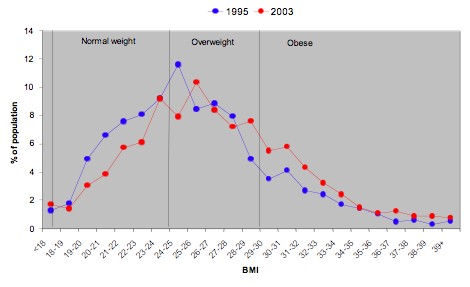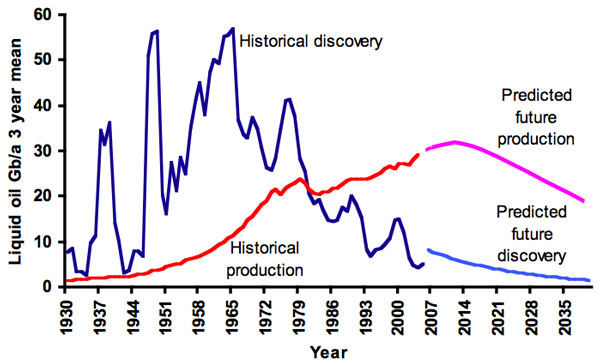Gerry McCartney and Phil Hanlon
December 2007
First written for the Scottish Public Health Observatory and reproduced with permission

This paper aims to illustrate the links between the sustainability agenda and the prevention of obesity.
It is clear that obesity is being driven by a number of factors that conspire to create an imbalance between the population’s energy intake and energy expenditure. This is best understood as follows: humans are obesogenic, that is, our evolutionary conditioning causes us to eat well when food is available and conserve energy when possible. This has not been a problem until we created an ‘obesogenic environment’: that is, one where high density food is readily available and average energy expenditure is low. The outcome is that the entire population body mass index (BMI) distribution shifts upwards (Figure 1). [1] The intensity of this obesogenicity is currently increasing with the expansion of the market-driven food manufacturing system that is responsive only to price signals, [2] and a physical environment increasingly created to suit the needs of continued economic growth as well as the values base of a consumerist society. It is clear that public health actions, as described in SOAR, are far outweighed by these societal trends that conspire to create an increasingly obese population. This imbalance of forces could lead to extreme pessimism when one considers the prospects for reversing this population shift in BMI through traditional public health measures alone.

Figure 1. The changing population weight distribution in NHS Greater Glasgow and Clyde adults between 1995 and 2003 [3]
Despite this, there are two phenomena that may have an effect of the same order as the obesogenic environment described above, but act in the opposite direction such that the population’s weight will be brought back to a much healthier range. These are 'peak oil' and climate change. To be clear, these phenomena may not result in an aggregate positive benefit to human health. That will depend on the prevalent mindset of the day, but there is the possibility of a health dividend being gained if the anticipated effects of peak oil and climate change are anticipated and acted upon sufficiently early and with appropriate policies.
Peak oil is a simple concept. When half of the global oil reserves have been used up, it will become increasingly expensive to extract the remainder, the volume of oil produced each year will fall and the price will increase. In short, there will inevitably be an oil production peak — a moment of maximum oil production after which production will decline (Figure 2). [4] The question is not if, but when. In the absence of any substitute energy sources, and there are no current examples of any energy source as cheap, portable or concentrated as oil, the decline in oil production rate will lead to a rapid rise in oil prices and a contraction of the globalised economy. Nation states excessively dependent on international trade, cheap transport (especially aeroplanes, cars and lorries) and cheap energy will be vulnerable to the international economic shock that will follow the peak in oil production. This could lead to a health effect not dissimilar to that seen in the former USSR in the early 1990s when economic collapse lead to a drop in life expectancy of over five years. [5] In contrast, nations that achieve a localisation of their economy and re-orientate their purpose towards the achievement of community well-being and sustainability may avoid the worst excesses of scarcity. This is akin to the maintenance of the health of the British population during the Second World War under rationing. Estimates of the exact timing of peak oil vary, but its effects are likely to be seen soon and almost certainly within the next 15 years.

Figure 2. The peak oil phenomenon (adapted from Campbell [4])
Climate change, influenced by human activity through the production of carbon dioxide and other greenhouse gases including methane, is a more familiar phenomenon than peak oil. The Scottish and UK governments have recently suggested that there is a need for an 80% reduction in emissions as our contribution to the global effort that is needed if we are to avoid reaching a ‘tipping point’ of climate change that could wreak havoc amongst the world’s ecosystems. Climate change could impact on health in a number of ways. For example, mass migration of populations may occur in response to scarcity of food and water. Alternatively, flooding may obliterate populous coastal regions and threaten the viability of arable farmland. The rapid rise of the global population has pushed civilisation into the most marginal land in history and means there are large populations now vulnerable to climatic changes. Civilisations have a long history of failing to make decisions based on the timescales of climate change and it remains to be seen whether our global society will act quickly enough to make the necessary change. [6] For greenhouse gas emissions to drop by enough to meet the targets, the mechanisms of production and travel will need to be revolutionised, with air travel being eliminated, road transport becoming rare and a generalised localisation of production. [7] There is no market incentive for this to occur and it runs counter to the demands of a growing economy.
It can, therefore, be seen that the peak oil and climate change phenomena require the same response if the worst excesses are to be avoided. Peak oil is inevitable and its impact will force change. Climate change could still be avoided despite its worst effects occurring decades after the emission of the implicated gases, although its negative effects are made worse with increasing delays in cutting emissions. It is not clear whether peak oil will occur early enough to force the necessary reduction in emissions to prevent catastrophic climate change.
Nations that make an early change to sustainability, both in terms of peak oil and climate change, could reap a substantial health dividend which includes reduced obesity, less inequality and enhanced well being. A sustainable society should remove the drivers of the obesogenic environment. This will have the effect of preventing those of normal weight becoming obese, and assist in the normalisation of the weight of those already overweight and obese. Carbon rationing and other likely measures present an opportunity to reduce inequalities through the adoption of a framework called ‘contraction and convergence’. [8] Our modern, individualised consumer society has damaged human well being so there is the real prospect that well-being and a sense of community will increase [9] as we make the adjustment to a more localised but sustainable way of life. Unfortunately nations that make a change to sustainability only when forced, when unsustainable practices and consumption patterns collapse, will be in a far more difficult position where there are no resources to invest in radical change. [10] This is likely to result in competition and associated inequality as seen in the former USSR during the 1990s. [5]
The public health community should therefore see the sustainability agenda as a potential lever for health improvement in addition to the need for sustainability for its own sake. When energy scarcity becomes apparent we should be ready to act as advocates for a system that produces equity and health, opposing those that will champion economic priorities. Public health professionals should step into this advocacy role urgently.
Gerry McCartney is a member of the Scottish Socialist Party.
References
1. Budewig K, Crawford F, Hamlet N, Hanlon P, Muirie J, Ogilvie D. Obesity in Scotland: why diets, doctors and denial won’t work. www.obesescotland.org.uk, 2004.
2. Lang T, Rayner G. Overcoming policy cacophony on obesity: an ecological public health framework for policymakers. Obesity Reviews 2007; 8: 165-81.
3. Data from Scottish Health Surveys 1995, 1998 and 2003.
4. Campbell C. Oil crisis. Brentwood: Multi-Science, 2005.
5. Notzon F, Komarov Y, Ermakov S, Sempos C, Marks J, Sempos E. Causes of declining life expectancy in Russia. JAMA 1998; 279: 793-800.
6. Diamond J. Collapse: how societies choose to fail or survive. London: Penguin, 2006.
7. Monbiot G. Heat: how to stop the planet burning. London: Allen Lane, 2006.
8. Hillman M, Fawcett T, Rajan S. The suicidal planet: how to prevent global climate catastrophe. New York City: Thomas Dunne, 2007.
9. Easterbrook G. The progress paradox: how life gets better while people feel worse. London: Random House, 2004.
10. Handy C. The sigmoid curve. In: The empty raincoat. London: Hutchinson, 1994.
Related publications
Available through the links page.
Text © Gerry McCartney and Phil Hanlon (2007) and licensed under the Creative Commons Attribution-NonCommercial-ShareAlike 2.5 Licence.
www.healthyfuture.org.uk
